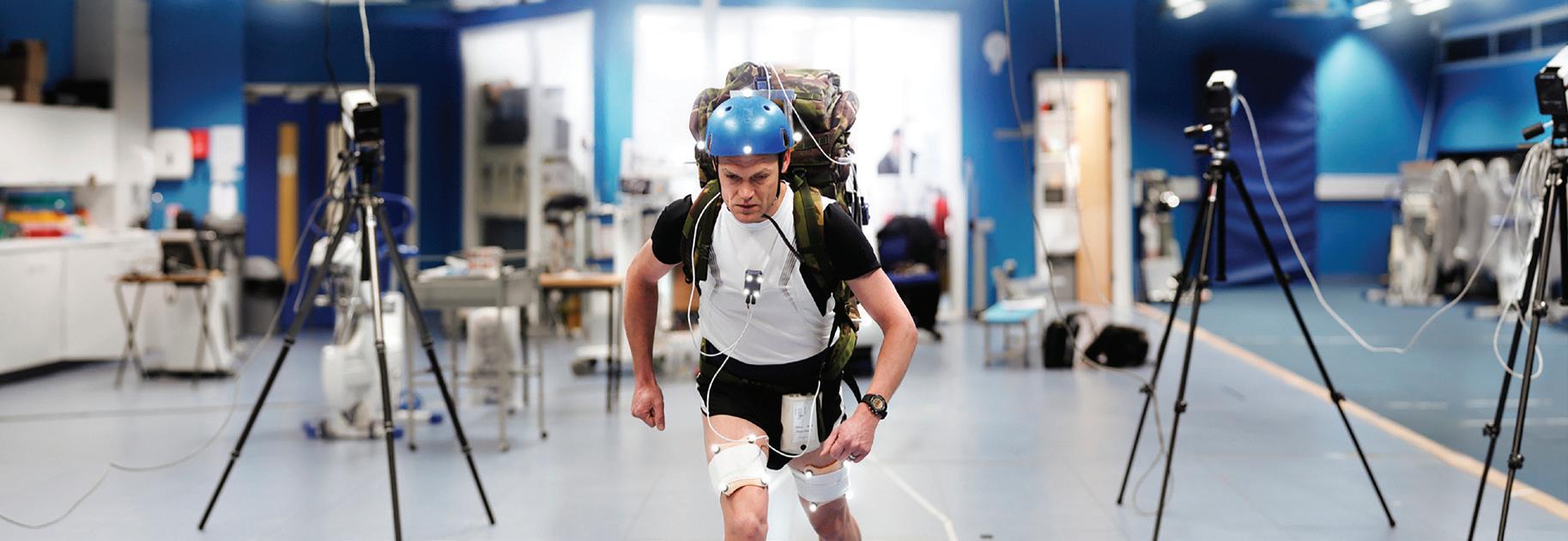
3 minute read
Research facilities
THE BODMER LAB is a purpose-built lab with a bright, modern space containing a range of the latest high-spec equipment for environment and life science research students.
The TRANSLATIONAL MEDICINE LAB is dedicated to translational biomedical research and includes three cell culture facilities, a metabolic suite as well as a genome sequencer. The CENTRE FOR HEALTH SCIENCES RESEARCH has world-class research facilities including a human performance laboratory, two other biomechanics laboratories, a clinical imaging suite, a cognitive neuroscience lab; developmental psychology and social psychology labs and a rehabilitation flat.
The SALFORD INSTITUTE FOR DEMENTIA epitomises our collaborative research ethos, bringing together a unique group of disciplines to research in the widest context the environment for people living with dementia and for their carers. This includes: the built environment; robotics, virtual reality, health and digital technologies; arts, music and design; health and social care professions; and social sciences.
Two of our facilities are one of a kind: our ENERGY HOUSE is the only fully climatecontrolled (inside and out) terraced house in the world, while our ACOUSTICS LABS house the largest number of acoustic facilities under one roof, including an anechoic chamber. We’re also the only University with a campus at MEDIACITY, with its industry-standard media facilities including TV, radio, chromakey and animation studies. THINKLAB combines physical and virtual spaces to provide innovative collaborative workspaces. It has supported research on distributed virtual environments for aerospace, automotive, building construction and space mission planning. OCTAVE is our world-class, fully configurable, immersive holographic experience which engages sight, sound, and touch to bring together people and objects in one single virtual reality. Our NEW ADELPHI building provides excellent facilities for students researching in the arts, including music, art and design and performance. This £55 million facility features a 350 capacity theatre, TV acting studios, industry standard recording studios, instrumental tuition rooms, a band-room/live room and a suite of flexible performance spaces. It’s little wonder that these world-class facilities attract partners including Rolls Royce, Airbus, the BBC and ITV, Sun Microsystems and BAE Systems, amongst many others.
EXTERNAL RESEARCH FUNDING
The most important sources of funding for postgraduate research students in the UK are the research councils. These bodies are government-funded agencies engaged in the support of research in different disciplines. The research councils do not generally make studentship awards directly to students, but usually allocate them to departments in universities. For further information, follow the links below:
Arts and Humanities Research Council ahrc.ac.uk
Biotechnology and Biological Sciences Research Council bbsrc.ac.uk
Economic and Social Research Council esrc.ac.uk
Engineering and Physical Sciences Research Council epsrc.ac.uk Medical Research Council mrc.ac.uk
Natural Environment Research Council nerc.ac.uk
Science and Technology Facilities Counci stfc.ac.uk
FindaPhD findaphd.com Partial funding for postgraduate study is also available from certain trusts, charities and foundations. This includes studentships, scholarships, grants, bursaries, competitions and prizes. INDUSTRY-SPONSORED RESEARCH
Industrial co-operative awards in science and technology (iCASE) provide funding for PhD studentships where businesses take the lead in arranging projects with an academic partner of their choice. Projects must be in the area of engineering and physical sciences. salford.ac.uk/ktp/industrial-casestudentships Knowledge Transfer Partnerships (KTPs) are a Europe-wide programme, part-funded by government, which form partnerships between universities and participating organisations. The recruiting organisation appoints suitably qualified postgraduate students to work on specific projects, while being jointly monitored by an academic supervisor. salford.ac.uk/research-industry
The Higher Education Innovation Fund Knowledge Exchange (HEIF) funds a broad range of research which results in economic and social benefit to the UK.
SUPERVISION, TRAINING AND DEVELOPMENT
Your supervision team - made up of a supervisor and co-supervisor with expertise in your topic area and methodology, along with a personal tutor for pastoral care - will guide and mentor you through your research programme. Supervision might also include a specialist from your field (e.g. a clinical staff member from the NHS). As a postgraduate researcher at the University of Salford, you can take advantage of an extensive range of development activities. This includes Salford Postgraduate Research Training (SPoRT) which is designed to help you develop the skills you need for effective research, and transferable skills to enhance your employability. The Salford Postgraduate Annual Research Conference – SPARC – offers a space for postgraduate researchers from all disciplines to exchange ideas while developing confidence and presentation skills. More details can be found at salford.ac.uk/ postgraduate-research/research-events
68 / SUPPORT









